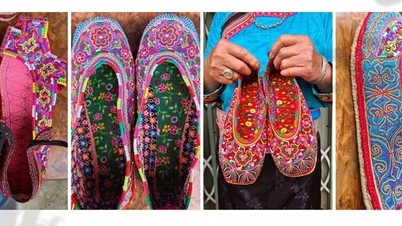Pregnant women and the elderly with underlying diseases should be careful
In recent days, the number of people with dengue fever coming for examination and treatment has increased dramatically at the Department of Tropical Diseases (Hospital E). From July 2023, the Tropical Diseases Clinic receives about 20 patients with dengue fever every day, of which 5-10 cases must be hospitalized for monitoring and treatment, including many pregnant women, the elderly and people with many underlying diseases.
Ms. NNH (in Minh Khai ward, Bac Tu Liem, Hanoi ) was 6 weeks pregnant with dengue fever. The pregnant woman was hospitalized with symptoms of fever on the second day, high fever continuously, fatigue, abdominal pain, nausea, abnormal vaginal bleeding. At first, patient H. mistakenly thought she had the flu and some other diseases so she did not seek treatment. Only when the symptoms became serious such as lethargy, cold extremities, was she hospitalized for treatment in a state of rapid pulse and low blood pressure.
Also being treated at the Department of Tropical Diseases, patient NKT (41 years old, in Minh Khai ward, Bac Tu Liem, Hanoi) is on the 3rd day of treatment for dengue fever. She said that there are 2 people in her family with dengue fever. She was subjective because she had had dengue fever several times, so on the 6th day with severe symptoms such as high fever, headache, dizziness, bleeding gums... not feeling better, so she went to the doctor and the doctors asked her to be hospitalized for treatment.
This patient added that every year Minh Khai ward is a hotspot for dengue fever with a very high rate of infection. Almost every time dengue fever breaks out, families have at least 2-3 people with dengue fever, although people have become more aware of preventing this disease such as sleeping under mosquito nets, killing mosquito larvae, and cooperating with the health sector to spray chemicals and insecticides to kill mosquitoes and insects, etc.
According to Dr. Dao Van Cao, Head of the Department of Tropical Diseases (Hospital E), elderly people with many underlying diseases such as diabetes, blood pressure, cardiovascular disease or pregnant women with dengue fever often have more severe symptoms and many complications. Pregnant women with dengue fever can give birth prematurely, have low birth weight babies, and bleed during and after birth.
Doctor Dao Van Cao analyzed that dengue fever in pregnant women in the early stages is dangerous. The virus will affect the mother's blood-forming organs, causing blood clotting disorders, reducing the number and quality of platelets, easily leading to miscarriage, birth defects, and stillbirth. In addition, dengue fever during labor can cause postpartum hemorrhage due to the disease reducing platelets. Even more serious is the blood clotting disorder leading to the risk of death for the mother and fetus.
“Currently, there is no vaccine to prevent dengue fever for pregnant women and no specific treatment, so pregnant women with dengue fever should go to a general hospital to have a combination of expertise between the obstetrics and tropical diseases departments to monitor and treat promptly, avoiding unfortunate consequences,” Dr. Cao emphasized.
Doctor Dao Van Cao said that up to now, the Tropical Diseases Department is monitoring and treating nearly 300 patients with dengue fever. Three months ago, there were patients with dengue fever admitted to the hospital, but in recent days, the peak number of patients with dengue fever treated at the Tropical Diseases Department has reached 30-40 people, accounting for more than 50% of the patients being treated at this department. For patients who have been treated stably, doctors at the Tropical Diseases Department have discharged nearly 200 patients.
According to Dr. Dao Van Cao, the health sector’s warnings about dengue fever have made people more aware of going to the doctor and getting early treatment when they have this disease. Therefore, the number of patients coming to the doctor has increased significantly. Although the number of patients is large, proactive disease prevention and the addition of folding beds for patients in the hospital rooms have limited the situation of patients sharing beds.
The whole country recorded nearly 47,000 cases of the disease.
According to the report of the Department of Preventive Medicine ( Ministry of Health ), from the beginning of 2023 to now, the whole country has recorded nearly 47,000 cases of dengue fever, including 11 deaths.
11 deaths in 7 provinces and cities including: Dong Nai (4 cases), Phu Yen (2 cases), Khanh Hoa (1 case), Ho Chi Minh City (1 case), Binh Phuoc (1 case), Dak Lak (1 case), Gia Lai (1 case). Compared to the same period in 2022, the number of cases decreased by 60.4% and the number of deaths decreased by 58 cases.
Statistics from the Ho Chi Minh City Center for Disease Control show that in the first 6 months of 2023, Ho Chi Minh City had 8,519 cases of dengue fever, lower than the same period in 2022. However, the Ho Chi Minh City Department of Health forecasts that according to the annual epidemic progression in the city, the peak season of dengue fever will increase in July and is expected to last until the end of October.
In Hanoi, according to the Hanoi Center for Disease Control, the number of dengue fever cases in Hanoi continues to increase rapidly, especially some outbreaks have many patients and are lasting for a long time.
Accumulated from the beginning of 2023 until now, Hanoi city has recorded 1,556 cases (an increase of more than 4 times compared to the same period in 2022) but no deaths have been recorded. Patients are distributed in 30/30 districts, towns and cities; 320/579 communes, wards and towns. Also in the past week, Hanoi had 19 more dengue fever outbreaks in 11 districts, including Bac Tu Liem (3 outbreaks); Cau Giay (2 outbreaks), Hoang Mai (2 outbreaks), Nam Tu Liem (2 outbreaks), Dong Da (2 outbreaks), Thanh Oai (2 outbreaks), Dan Phuong (2 outbreaks) ...
Through actual treatment, doctors at the Department of Tropical Diseases (Hospital E) encountered severe disease progression of dengue fever patients such as coughing up blood, high liver enzymes, pleural effusion, peritoneal effusion, low blood pressure, etc. Therefore, in the face of unpredictable developments of dengue fever, Dr. Dao Van Cao recommends that if people have a sudden high fever, they should go to the hospital immediately, because dengue fever can progress from mild to severe, so patients need to be examined, clinically classified to predict the disease and have an appropriate treatment plan.
Dengue fever is a mosquito-borne viral infection that causes severe flu-like symptoms and sometimes leads to a potentially fatal complication called severe dengue. The Aedes mosquito is the main vector of dengue. There are four serotypes of the virus that cause the disease: DEN-1, DEN-2, DEN-3, DEN-4.
In Vietnam, there are all 4 serotypes of this virus. Patients infected with a particular strain of the virus can only develop lifelong immunity to that strain. Therefore, people living in areas where dengue fever is endemic can get the disease caused by other strains.
To actively prevent disease for yourself, your family and everyone around you, the Ministry of Health strongly recommends that people take the following disease prevention measures: 1. Cover all water containers tightly to prevent mosquitoes from laying eggs. 2. Weekly, take measures to kill mosquito larvae by putting fish in large water containers; washing medium and small water containers, turning over containers that do not contain water; changing the water in flower vases; adding salt or oil to the bowl of water placed under the cupboard. 3. Weekly remove waste materials and natural water holes that do not allow mosquitoes to lay eggs such as bottles, jars, broken glass, coconut shells, broken jars, old tires/tires, bamboo holes, leaf sheaths... 4. Sleep under mosquito nets and wear long clothes to prevent mosquito bites even during the day. 5. Actively coordinate with the health sector in chemical spraying campaigns to prevent and control epidemics. 6. When you have a fever, go to a medical facility immediately for examination and treatment advice. Do not self-treat at home. |
Source




































































































Comment (0)